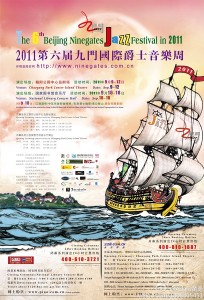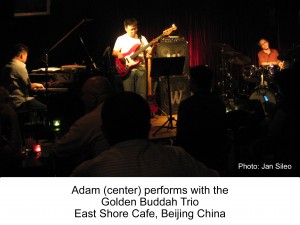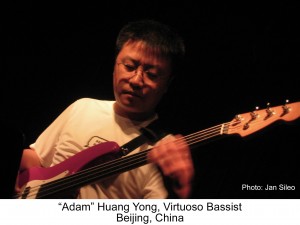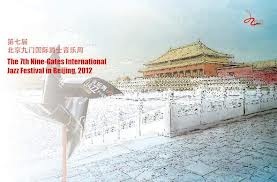This week’s blog is a continuation of profiles, from early September, of indigenous Chinese jazz musicians from my forthcoming book Jazz in the Land of the Dragon.
Huang Yong, or “Adam,” as he prefers to be called, is the virtuoso electric bass player with the Golden Buddha Trio led by piano virtuoso Kong Hongwei. The first night I watched Adam perform he took a longish solo without benefit of drum backup that demonstrated not just extraordinary technique, but also a development of improvisational ideas that was jaw-dropping. In addition to his performing abilities, he also has an entrepreneurial streak due to his involvement in the development of an annual jazz festival in Beijing, now known as the Nine Gates Jazz Festival.
He started playing jazz while attending the Beijing Normal University where he was studying music. His teacher gave him a jazz tape to listen to. This was in 1989. His response: “The first time I heard it, I thought it was quite strange. But later, I thought, ‘Oh, it’s very good music.’ That’s why I started to learn jazz.”
Adam is essentially self-taught on the electric bass. He started by learning walking bass listening to Amrican bassist Ray Brown. Later, a friend gave him a Jaco Pastorius tape. He continued his learning by listening to different kinds of jazz musicians and copying their playing.
 I asked Adam his view on the Beijing jazz scene in particular and the jazz scene in China generally. His response: “That’s a very good question. Last year I organized a jazz festival. We had 10 to 15 bands. I found the jazz bands in China right now are at a very good level. Last year [in 2005], we had a big band, trios, quartets, quintets, funky bands, some electric jazz bands, many local musicians.
I asked Adam his view on the Beijing jazz scene in particular and the jazz scene in China generally. His response: “That’s a very good question. Last year I organized a jazz festival. We had 10 to 15 bands. I found the jazz bands in China right now are at a very good level. Last year [in 2005], we had a big band, trios, quartets, quintets, funky bands, some electric jazz bands, many local musicians.
“Eight or ten years ago, I heard somebody playing the music, playing the guitar and we were asking ‘Is that jazz?’ or ‘Does this sound like swing, stand up jazz?’ I don’t think it sounds like jazz. We had this kind of conversation. But now, the situation has changed. We have grown up musically in China. Many local musicians write down their own music: our blood. We think about music, but not like American jazz, not close to European jazz. We think about local music. We write it down, we play it. Last year, I did the jazz festival. Many, many, television stations and newspapers, they talk with me. We talk about this. I think I can say now we have our own jazz music. It comes from the [Chinese] heart.
“I am a bass player. I play with many musicians, saxophone players, piano players, guitar players, many drummers. There are a lot of very good local musicians in China. This year we will have a new jazz festival at the Jon Shan Music Hall, August 23rd to 25th August. The hall has 1,200-something seats. So in three days almost 4,000 people can come to see the performances. And we did more promotion. I printed a little card, and put our jazz festival’s information on it. We printed 50,000 pieces and sent it out to music shops around the whole country. Customers will go into the music shop to buy CDs, and they can get information that says we will have a jazz festival in Beijing in August. This year, too, we will videotape the concerts. This might be the first time a live jazz concert has been recorded in China. It will result in a CD and a DVD.
“Last year we had ten local bands, not from Shanghai or Guangzhou, only from Beijing. They all have their own music, their own Chinese jazz songs. Every year in the future I will do this festival. More and more people will come to know jazz music. It’s different than pop. But now, many people in China, when we talk about jazz, they think, ‘Oh, it’s long hair. It’s different, the music.’ I think we do our best. Every year, we do the festival; we do concerts, and let many more people know of this. I think this grows every year.
“In China people think that jazz music is kind of the high-level, or high-life music. And so I think that in a big city, like in Beijing, people are willing to pay money to come to try this kind of music. In China there are not so many chances for jazz musicians to play in a big hall, or a big festival. So once I called the musicians, inviting them to come to our festival, they were very happy.
“Many people in China, they know jazz, from radio, sometimes from a magazine, from a newspaper, they know jazz. But they cannot listen to jazz from the radio. They know jazz, this word they know. They know that it’s America. They know blues, but they know it’s not like rock and roll, punk music, or heavy metal. They know that. So when I do a jazz festival in a big theatre, it’s good. They’ll pay money to watch and listen.”
Adam has made good his promise. In mid-May 2007, Adam mounted an international jazz festival with bands from Europe, Japan, Korea, and from South America. Today, Beijing boasts an annual Nine Gates Jazz Festival, in addition to other jazz festivals and an on-going jazz scene. The latest took place September 14-23, 2012 in various venues around Beijing.
According to ChinaCulture.org:
While American saxophonist Antonio M. Hart and veteran jazz pianist Meddy Gerville from France’s Réunion Island are the headliners at this year’s Nine Gates Jazz Festival in Beijing, a string of young performers and local ensembles promise to inject the annual event with a more intimate, fresh vibe. With 27 Chinese and international bands joining the celebrated occasion, jazz will be heard nightly in a number of theaters across [Beijing]. . . .
Named after the nine ancient city gates in Beijing, the festival will mark its seventh year by opening at the Cultural Center of Xicheng District with two young jazz bands. The festival comprises performances at three venues in Xicheng district, with two-hour jazz performances nightly.
Twenty-one Chinese jazz bands will join six others from the U.S., Austria, France, Poland and Czech Republic by playing improvised music with styles ranging from century-old New Orleans jazz to big band swing and bebop, the latter characterized by its lively tempo, instrumental virtuosity and improvisation.
The opening show will be performed by the Abu Jazz Trio featuring 13-year-old pianist prodigy Dai Liang and the Li Gaoyang Jazz Quartet led by its namesake 18-year-old saxophonist.
“This is our deliberate arrangement as we want to show to the audience that the jazz world in Beijing is becoming younger,” said Huang Yong.
 “It is inevitable a growing number of young musicians with classical music training have embraced jazz as there has been a better atmosphere for the music in past years,” said Huang. “With more local musicians playing jazz and a growing number of performances and recordings, younger musicians have more exposure to the imported genre. . . .Young musicians are sure to attract younger audiences, and we hope that their love for jazz can influence their peers and introduce more people to the music,” Huang said.
“It is inevitable a growing number of young musicians with classical music training have embraced jazz as there has been a better atmosphere for the music in past years,” said Huang. “With more local musicians playing jazz and a growing number of performances and recordings, younger musicians have more exposure to the imported genre. . . .Young musicians are sure to attract younger audiences, and we hope that their love for jazz can influence their peers and introduce more people to the music,” Huang said.
According to Huang’s estimation, the number of people in Beijing who regularly attend jazz performances stands at fewer than 10,000. The biggest hurdle in holding the festival, Huang conceded, was securing financial support from the government. Each night of the festival is estimated to cost $50,000. Last year 70 percent of total tickets were sold for the festival, while half the tickets have been sold for this year’s event, according to venue coordinator Feng Xiang. “We have been in talks with the Xicheng district government for six months. It pulled out from offering financial support, but fortunately has provided venues for us,” Huang said.
Please write to me at meiienterprises@aol.com if you have any comments on this or any other of my blogs.
Eugene Marlow, Ph.D.
October 15, 2012
© Eugene Marlow 2012



